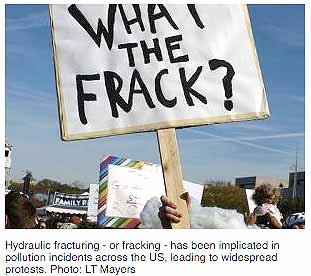Biblio
Universal Well Services is one of the large companies being investigated by the U.S. House Energy and Commerce Committee to see if the gas extraction method known as hydraulic fracturing, or fracking, is a hazard to groundwater drinking supplies.
According to its website, Universal is a premier source for hydraulic fracturing, cementing, nitrogen and acidizing services in the Appalachian Basin.
With its corporate headquarters in Meadville, Pa, Universal Well Services, Inc has grown from 200 employees in 2002, to over 800 employees at the end of 2007. Universal Well Services is a division of Patterson-UTI, and the parent company of Eastern Reservoir Services.
Universal’s services in the Appalachian Basin include hydraulic fracturing, as well as acidizing, cementing and nitrogen services. Specialty services include engineering, chemical cleaning, jetting and high pressure pumping.
Abstract:
As the hunt for important unconventional gas resources in America expands, an increasingly popular method of wringing resources from stubborn underground formations is a process called hydraulic fracturing – also described as hydrofracturing, fracking, or fracing – wherein fluids are pumped at high pressure underground to fracture a formation and release trapped oil or gas.
Operators have fraced wells for more than fifty years, but the practice has recently grown rapidly in areas like the Barnett Shale of North Central Texas and the Marcellus Shale beneath Pennsylvania, New York, and other Appalachian states.
This Article describes the process of hydraulic fracturing, existing studies of the environmental effects of hydraulic fracturing, and the laws and regulations that apply to the practice. It argues that there is no direct federal regulation of the fracing process (the pumping of fluids into a wellbore), that court guidance in this area is limited, and that state regulations differ substantially.
Although other general regulations apply to the practice, the Article argues that in light of the dearth of regulation specific to fracturing in some areas, more study of the potential environmental and human health effects of fracing is needed in order to determine whether current regulation is sufficient. The EPA completed a partial study in 2004, but this Article focuses on the deficiencies of that study and calls for a new, national, scientific study of the practice.
Conclusion:
...no one knows the full range of effects because they have not been adequately researched. The EPA’s report is the most comprehensive to date, but was part of a highly-charged political process and was never completed, because the EPA concluded, perhaps prematurely, that further study was unnecessary.
Furthermore, the report investigated fracing in only one type of formation – coalbeds – and assessed the impacts of one stage of fracing, failing to seriously consider concerns such as groundwater depletion and surface disposal of fracing waste.
The highest regulatory priority for fracing should be the instigation of a federal, scientifically rigorous report prepared by the National Academy of Sciences or a similar “neutral” body and a simultaneous regulatory risk-limiting mechanism.
Next, based on the data contained within this report, and given the risks of certain types of fracing, Congress should consider reversing its 2005 exemption of fracing from the Safe Drinking Water Act; it should not wait to commence this process pending the completion of the report, although the report will be essential for future statutory and regulatory decisions.
...In the rush to extract essential resources, a process which itself contributes to human wellbeing, other aspects of human wellbeing – the quality of the environment and public health – must not be cast aside as a mere impediment to progress.
See: Oil & Gas Accountability Project (OGAP)
See also: Pew Campaign for Responsible Mining
The gas stored in the Marcellus Shale formation is the subject of desperate drilling to secure US domestic energy supplies. But the process involved - hydraulic fracturing - is the focus of a bitter dispute over environmental damage and community rights.
It is a timeless patchwork of small dairy farms and endless hills, emblazoned with the blood-red tints of an autumnal Pennsylvania forest. Set against this sleepy backdrop, however, the constant convoys of water trucks rumbling along the deserted country roads suggest something profound is taking place. This is ‘fracking’ country, the latest frontier in America’s desperate search for fossil fuels.
Pioneered by companies such as Halliburton, high-volume horizontal slickwater fracturing – otherwise known as hydraulic fracturing, or simply fracking – involves the drilling of horizontal wells that are then injected with large volumes of water, sand and chemicals at high pressure to open up rock fractures and help propel rock-trapped gas back to the surface.
Professor Anthony Ingrafea, one of the world's leading experts on fracture mechanics, based at Cornell University, told the Ecologist:
...there is an overriding urgency to slow down the fracking rush. 'I'm not anti-oil and gas. What I'm against is an industry that is so out of control in using a new technology that does not have proper regulation, and enforcement of regulation, that they're riding roughshod over a large segment of the population.'
"Of the 84,000 chemicals in commercial use in the United States -- from flame retardants in furniture to household cleaners -- nearly 20 percent are secret, according to the Environmental Protection Agency, their names and physical properties guarded from consumers and virtually all public officials under a little-known federal provision."
- « first
- ‹ previous
- 1
- 2
- 3










